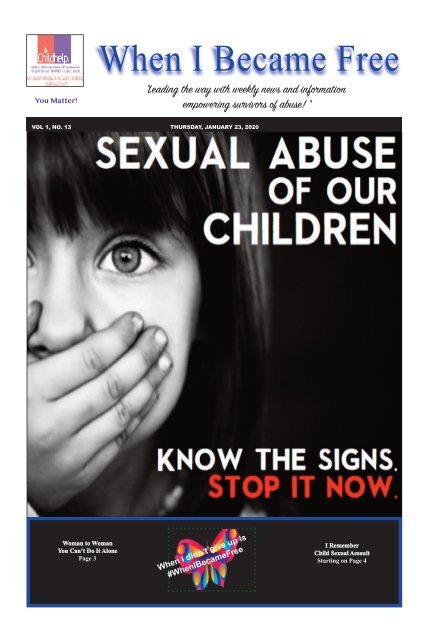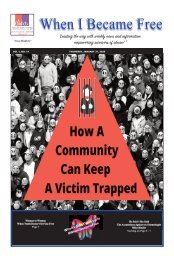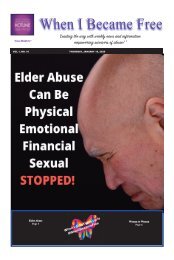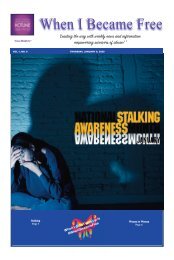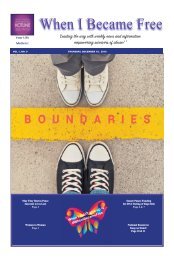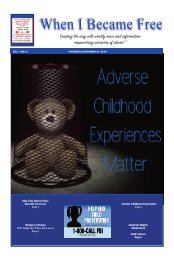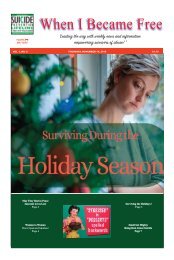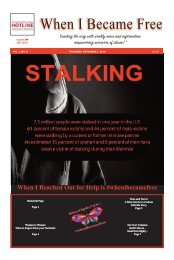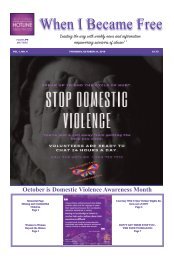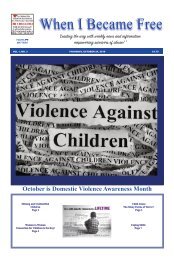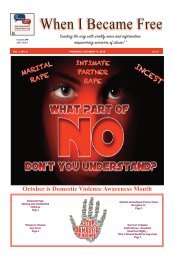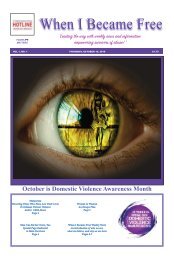Jan 23, 2020 When I Became Free
In this week's issue we focus on the topic of child sexual assault and what you can do to prevent it. Please share
In this week's issue we focus on the topic of child sexual assault and what you can do to prevent it. Please share
- No tags were found...
Create successful ePaper yourself
Turn your PDF publications into a flip-book with our unique Google optimized e-Paper software.
<strong>When</strong> I <strong>Became</strong> <strong>Free</strong><br />
You Matter!<br />
“Leading the way with weekly news and information<br />
empowering survivors of abuse!“<br />
VOL 1, NO. 13 THURSDAY, JANUARY <strong>23</strong>, <strong>2020</strong><br />
Woman to Woman<br />
You Can’t Do It Alone<br />
Page 3<br />
<strong>When</strong> I didn’t give up is<br />
#<strong>When</strong>I<strong>Became</strong><strong>Free</strong><br />
I Remember<br />
Child Sexual Assault<br />
Starting on Page 4
Page 2 <strong>When</strong> I <strong>Became</strong> <strong>Free</strong> <strong>Jan</strong>uary <strong>23</strong>, <strong>2020</strong><br />
<strong>When</strong> I <strong>Became</strong> <strong>Free</strong><br />
Published online each Thursday (sometimes Friday )and delivered<br />
via email to sponsors, <strong>When</strong> I <strong>Became</strong> <strong>Free</strong> is an independent freelance<br />
project/publication with a mission to bring awareness to issues<br />
around abuse (child abuse, domestic violence, and sexual assault).<br />
The goal of the project is to be a vehicle of inspiration and empowerment<br />
for survivors. Sponsors of this publication help to support<br />
services, support groups, and workshops freely provided to survivors<br />
of abuse. All of our freelance writers are survivors of abuse.<br />
The <strong>When</strong> I <strong>Became</strong> <strong>Free</strong> Project<br />
was created and is managed by:<br />
Eva Marie Woywod<br />
<strong>Free</strong>lance Writers:<br />
Kelli Bungert<br />
Mechelle Cichy<br />
Savannah May<br />
Proofing:<br />
April Fichthorn<br />
Bethany Fichthorn<br />
Gabriel Brown<br />
Kyle Roberts<br />
Phone Number 901 949-2226<br />
Email: <strong>When</strong>I<strong>Became</strong><strong>Free</strong>@gmail.com<br />
Website: whenibecamefree.com<br />
ISELA MAURICIO-SANCHEZ<br />
27-YEARS OLD<br />
Advertising: advertising helps the <strong>When</strong> I <strong>Became</strong> <strong>Free</strong> Project to<br />
provide free workshops, support groups and more to survivors of<br />
abuse on their healing journey.<br />
According to news reports an arrest warrant for<br />
first-degree murder was issued for the father of a<br />
boy who is the subject of an Amber Alert (see<br />
below).<br />
Three-year-old Osiel Ernesto Rico is believed to<br />
with Jorge Rico-Ruvira.<br />
Osiel’s mother, Isela Mauricio-Sanchez, was<br />
found dead at her home in Roswell.<br />
Police reported, Rico-Ruvira was arrested in October<br />
for battery on a household member. Law enforcement<br />
have stated that he choked Isela while she<br />
was in her bed with her child.<br />
“We believe there is a strong possibility he left<br />
the state,” said Roswell police spokesperson Todd<br />
Wildermuth. “Because of that potentially crossing<br />
state lines, we have the assistance of the FBI also."<br />
Anyone with information about the case is encouraged<br />
to call authorities at 1-800-457-3463 or<br />
dial 911.<br />
At the time <strong>When</strong> I <strong>Became</strong> <strong>Free</strong> Weekly News<br />
published our digital paper, the father and child<br />
were still missing.<br />
Amber Alert Issued After<br />
Mother Found Dead
<strong>Jan</strong>uary <strong>23</strong>, <strong>2020</strong> WHEN I BECAME FREE Page 3<br />
Woman to Woman<br />
You Can’t Do It Alone<br />
MECHELLE CICHY<br />
THEWRITEEMPATH@GMAIL.COM<br />
People! Who needs them? Right? They can be nosy,<br />
overbearing, bossy, inconsiderate,<br />
rude and downright<br />
hateful. People can pass<br />
judgment on us for minuscule<br />
infractions we may not<br />
even be aware of. Sometimes<br />
they can be impatient<br />
despite the fact we are doing<br />
the best we can. People are<br />
backstabbers, liars, abusers<br />
and psychopaths.<br />
However, humans are social<br />
animals and as such, we<br />
need our people. We are not<br />
meant to be alone. But, after<br />
suffering from abuse, survivors<br />
have a difficult time<br />
feeling comfortable around<br />
other people, no matter who<br />
they may be.<br />
First of all, there are trust<br />
issues. They once trusted the<br />
abuser to love and care for them. That trust was disrespected<br />
and stomped on over and over again. How can they<br />
trust someone else not to repeat the same bad behavior?<br />
Whether it was a parent, a lover, a coach or a member of the<br />
clergy, or someone else, the victim trusted that he or she<br />
was safe in their care.<br />
Then there are the self-esteem issues. Survivors of abuse<br />
have a horribly low sense of self-esteem thanks to the<br />
abuser. In order to keep the victims in line, it's necessary to<br />
break their spirit and sense of self. Leaving the abuser behind<br />
does not automatically restore that self-esteem. It<br />
takes years of conscious hard work to bring back a healthy<br />
love of self.<br />
It's tempting to try to live independently of anyone. How<br />
many of us have thought we would love to live on our own<br />
deserted island with supplies mysteriously dropped during<br />
our sleeping hours so we never have to see another person<br />
again? No more traffic jams during rush hour. Rude salesclerks<br />
after a hard day's work? Nope! No keyboard warriors<br />
to ruin our quiet time online.<br />
The fantasy sounds wonderful when people are annoying<br />
and rude. However, we seldom think so much of that<br />
dream at night when the curtains are closed, the bed is<br />
empty and supper is a microwave meal because it's too<br />
much trouble to cook for one. We are alone with our<br />
thoughts and insecurities.<br />
As I mentioned earlier, we were not meant to live in<br />
solitude. As much as other humans drive us insane, we need<br />
them sometimes. As survivors, we probably need them<br />
more than other people do.<br />
Survivors need a support system. We would love to be<br />
able to heal on our own without help from anyone else. It<br />
would eliminate the issues we have with trusting others.<br />
But, our brains have been incorrectly programmed by the<br />
abuse we suffered.<br />
Our emotions, memory, thinking and sense of self have<br />
all taken hits. We have a bad baseline to build on.<br />
You might liken building a new life and new self to a carpenter<br />
building a house. If the ground he builds on is unstable<br />
or uneven, the house will ultimately collapse. The<br />
same happens if you try to rebuild your life with the faulty<br />
thought processes the abuse programmed into the brain.<br />
Unhealthy coping mechanisms such as substance addictions<br />
or self-harm are hardly the things to build a new life<br />
upon.<br />
Survivors are plagued with self-doubt and criticism<br />
which hinders the confidence needed to make necessary<br />
changes to rebuild. “I'm not good enough” and “I can't do<br />
that” come from the abuse programming. Without the support<br />
of other caring individuals, it's difficult to impossible<br />
for the survivor to push through the fear to find success. A<br />
woman I know is a good example of this. She had seldom<br />
driven a car for any distance, or in a larger city. If she wasn't<br />
being made to tag along with her husband, there was always<br />
someone else who could and would drive her where<br />
she needed to go. After leaving her abuser, she had to make<br />
weekly trips to a city quite a distance away.<br />
The initial fear was almost debilitating. After she successfully<br />
made the trip herself a couple times, the fear was<br />
gone and she had gained a new level of confidence. But, it<br />
took not a little prodding from those of us who were her<br />
support people to convince her she could do it.<br />
Some of the things abusers tell their victims is that they<br />
are worthless or stupid or ugly, or incompetent. Being told<br />
this over and over rewires the brain into believing it's true.<br />
To reverse the programming, it may take someone else saying<br />
over and over “you are good enough”, “you are worthy”,<br />
“you can do it”, “I have confidence in you” and<br />
whatever else counteracts the hateful things that had been<br />
said.<br />
While it's understandable for survivors to be afraid to<br />
ever trust another person again, it's imperative that they do<br />
for their support system. However, it's also important that<br />
they find someone who is worthy of their trust, or they may<br />
fall for the same abuse from a different abuser. Where they<br />
find the trustworthy people may depend upon their life situation.<br />
Most abuse organizations have advocates who can work<br />
with survivors. A therapist may suggest a few local organizations<br />
from the area. Online support groups exist as well.<br />
In fact, I am one of the moderators of a Facebook group<br />
dedicated to helping victims and survivors of abuse. You<br />
can find it by searching for “<strong>When</strong> I <strong>Became</strong> <strong>Free</strong> Support<br />
Group”. Someone is usually always available for support,<br />
help or to just listen.<br />
So, as much as we might wish sometimes for everyone<br />
else on the planet to disappear, there are times when we<br />
need them around. If we want to heal, we can't do it alone.
Page 4 <strong>When</strong> I <strong>Became</strong> <strong>Free</strong> <strong>Jan</strong>uary <strong>23</strong>, <strong>2020</strong><br />
BY EVA MARIE WOYWOD<br />
WHENIBECAMEFREE@GMAIL.COM<br />
"Shhh...Be a good little girl, don't tell."<br />
"If you tell, you will be punished, they will not believe you."<br />
"I will kill your family if you tell."<br />
That is what I remember.<br />
I remember their hands on my young skin.<br />
I remember time standing still.<br />
I remember holding my breath, being frozen in place.<br />
I remember being sexually assaulted at the age of 5, at the age of 8, at the age of 9, at the<br />
age of 13...maybe I was 14, and then also as an adult.<br />
I remember each one of my predators.<br />
I remember holding on to the secrets so tightly that my entire being became those secrets I<br />
was hiding, I lost touch with myself.<br />
I remember wanting to die, many times over.<br />
I remember fearing what people would think of me if they knew my truths.<br />
I remember not even knowing how to start telling those secrets.<br />
I remember telling my cat about my secrets.<br />
I remember after attempting suicide as a teen and telling my mother about some of those<br />
secrets, how she rejected me and told me never to talk about them again - it was disgusting.<br />
I remember how that rejection felt like a kick to my soul and feeling like I was falling off a<br />
cliff.<br />
I remember the nightmares I have had over the years, running away from a dark figure<br />
chasing me.<br />
I remember the panic attacks, the PTSD I have being triggered by simple things, like the<br />
smell of alcohol on someone's breath or having my mouth covered.<br />
I remember so many small details like the rain falling outside, the odor of the wet leather<br />
jacket sitting next to the couch when I was being molested. I remember crawling down a hallway<br />
and hiding in a closet until one of my predators stopped knocking on the back door to our<br />
apartment. He knew I was home alone. I was 8-years old. He was an adult, a veteran who just<br />
years before came home from the Vietnam War.<br />
I remember that right before one of the attacks from yet another predator, that I had just<br />
purchased an old Elvis Presley album from a thrift store and the week after the that Elvis died.<br />
I remember little things from all of the assaults: like the crack in the ceiling, the sound of<br />
a fan, the foyer to the apartment building and the dust in the corners and under the mailboxes.<br />
I remember that after each attack I felt emptier than before - each one taking more and more<br />
from me.<br />
I remember the night I finally wrote out my truths and started sharing them on a blog I<br />
publish that I was terrified of what the world would think of me but at the same time I started<br />
knowing what the feeling of freedom actually felt like. I remember when I first spoke up and<br />
out and how that is #<strong>When</strong>I<strong>Became</strong><strong>Free</strong>. That was when I finally started realizing that the little<br />
girl I once thought was lost forever, was always within me. She was never lost.<br />
Little girl -please don't worry.. don't you cry<br />
Your heart on that night it didn't die<br />
Little girl- please don't worry, don't you cry<br />
One day dreams will soar...and above this you will fly<br />
THE COMFORT OF A CHILD'S IMAGINATION<br />
<strong>When</strong> I was a little girl nightmares would invade my sleep. In them I was always being<br />
chased by men in a black car. I would run into a building, dash up the stairs and they would<br />
follow. I could never make out their faces, they were just shapes. Somehow I would dodge<br />
them once on the top floor - on the landing, and then I would descend down the stairs but I wasn't<br />
running, I was floating as I dove down the flight.<br />
It seemed like the nightmare would replay itself over and over until I woke up shivering<br />
in fear and trembling with exhaustion. Waking up I would need to catch my breath. For as long<br />
as I can remember this nightmare reoccurred throughout my childhood, and even at times when<br />
I turned into an adult woman.<br />
I learned at a very young age how to avoid sleep. A reaction that turned into a habit which<br />
also followed me into adulthood. Anyone who knows me well knows that when I am feeling<br />
overwhelmed and stressed I will be up during the wee hours of the night attempting to keep my<br />
mind busy with whatever it is I can find.<br />
<strong>When</strong> I was a child I did this by creating stories in my head. Ones that allowed me an escape<br />
from the pain I really didn't understand that I was experiencing.<br />
My favorite "go to" story was about the toy chest that could be found in my closet. At the<br />
time we lived in an old Victorian era building - on the top floor was our apartment. Truly it was<br />
an elegant apartment. Three bedrooms and two bathrooms, floor to ceiling windows and a hallway<br />
that seemed to go on forever. That third bedroom was actually at one time in its history<br />
considered the maid's quarters. It was just off the kitchen and for the most part separated from<br />
the rest of the apartment. The closet inside it was a small walk-in. That room was all mine.<br />
I would lay in my bed with my eyes clenched shut, blankets over my head. My cocoon<br />
of safety from the darkness shrouding my room. That is when I would take comfort in my<br />
story. The one where once inside the closet I would close the door after turning on the light. I<br />
then would open that old toy chest and crawl in as I moved aside my dolls and stuffed animals<br />
to reveal a secret passage, a door at the bottom of the chest.<br />
Upon lifting open the door a staircase would come to view and at the bottom was a store,<br />
a toy store filled with all my favorite and most wanted items. My Siamese cat, Kelly, would<br />
always be with me. He protected me, and knew all my secrets. The only living soul other than<br />
myself and those who had harmed me, who did. Kelly was good at keeping secrets.<br />
There I would stay, in that toy store of my imagination. Sometimes the toys would come<br />
to life just like on the Island of Misfit Toys in Rudolf the Red Nosed Reindeer. Still to this day<br />
when I see the movie I think back to those nights and my special story.<br />
As the story played out in my head I would drift off to sleep and if my nightmare woke<br />
me up, I would start the story all over again. Little did I know then I was coping - kicking in a<br />
survival mechanism. Nor did I realize I was being creative - all that I knew was that it was what<br />
I needed to do to get through the night.<br />
It would take years and some counseling before I realized those nightmares I had were because<br />
as a child I was overwhelmed with fear and confusion. The Boogeyman did not live in<br />
my house but he did live next door, in the apartment next to us - and another one lived with<br />
someone I was close with.<br />
As twisted as it may sound to some - in a way I am thankful that as a child I was basically<br />
forced to use my imagination and be as creative as possible to find comfort. <strong>When</strong> I was a teen<br />
my form of expressive creativity turned to writing and poetry - as I went through my journey<br />
of healing I relied heavily on my ability to express myself through writing. Being creative<br />
while under pressure has been the one tool that has kept a roof over my children's head, and<br />
food on that table as I juggle life as a single mom and survivor of domestic violence.<br />
Continued on the following page
<strong>Jan</strong>uary <strong>23</strong>, <strong>2020</strong> WHEN I BECAME FREE Page 5<br />
CONTINUED FROM PREVIOUS PAGE<br />
The words I shared with you on the previous page are the words I wrote along my healing<br />
journey and have been published to my blog, Thankfully Chewed Up and Spat Back<br />
Out. They convey snippets of my past, when I was a victim. A young child trying to attempt<br />
to make sense out of world that was confusing and scary.<br />
Buried in those words are the signs that I was a child who had experienced sexual assault.<br />
Signs that my loved ones, my parents and other adults around me missed. They<br />
missed those signs because, in my case, this all took place in a generation where we buried<br />
our heads - society was not working to bring awareness to issues of trauma and abuse.<br />
Children were to be seen, not heard.<br />
I am thankful that in today’s society people like me are now able to share our experiences<br />
to a wide audience in an attempt to bring awareness so that no other child ever has<br />
to know nor carry the pain of child abuse and child sexual assault.<br />
Let’s take a look at the signs buried within my words - I went from a happy carefree<br />
child to being careful not to bring attention to myself, I withdrew. I became hypersensitive<br />
to my surroundings. I had nightmares and I attempted suicide at an age so young<br />
where I should have only known to how live.<br />
There are others aspects of my childhood I haven’t shared here but they would have<br />
shown that I was an ill child, always getting sick. Low self esteem started taking over my<br />
emotions and my thoughts.<br />
Granted, all of these signs could have painted the picture of something else, but in the<br />
end, they all showed that I was a child who needed attention beyond a passing glance.<br />
<strong>When</strong> I finally told my mother what had happened to me, she recoiled and placed more<br />
worries and shame on my shoulders. I was only 14-years old and already wishing I could<br />
disappear. After that days she never brought the topic up again - I would be an adult before<br />
I revisited it with her.<br />
Now as a parent I cannot imagine what it would be like to hear such horrors from my<br />
child and thankfully, I never have had to absorb such a nightmare. For the parents who do,<br />
I want you to know your reaction to your child’s truth can make or break when and how<br />
their healing journey will begin. That is a heavy responsibility, however, at the same time<br />
if you take a deep breath and reach out for the right help, you will be providing a safety<br />
net for the life you created. There is help. It will not erase the harm but it will save unneeded<br />
additional trauma.<br />
To set the stage for your child to feel comfortable coming to you it should begin as early<br />
as possible. The following comes from the advocacy group RAIIN:<br />
Be involved in the child’s life.<br />
Being actively involved in a child’s life can make warning signs of child sexual abuse<br />
more obvious and help the child feel more comfortable coming to you if something isn’t<br />
right. If you see or hear something that causes concern, you can take action to protect your<br />
child.<br />
Show interest in their day-to-day lives. Ask them what they did during the day and who<br />
they did it with. Who did they sit with at lunchtime? What games did they play after<br />
school? Did they enjoy themselves?<br />
Get to know the people in your child’s life. Know who your child is spending time with,<br />
including other children and adults. Ask your child about the kids they go to school with,<br />
the parents of their friends, and other people they may encounter, such as teammates or<br />
coaches. Talk about these people openly and ask questions so that your child can feel comfortable<br />
doing the same.<br />
Choose caregivers carefully. Whether it’s a babysitter, a new school, or an afterschool<br />
activity, be diligent about screening caregivers for your child.<br />
Talk about the media. Incidents of sexual violence are frequently covered by the news<br />
and portrayed in television shows. Ask your child questions about this coverage to start a<br />
conversation. Questions like, “Have you ever heard of this happening before?” or “What<br />
would you do if you were in this situation?” can signal to your child that these are important<br />
issues that they can talk about with you. Learn more about talking to your kids<br />
about sexual assault.<br />
Know the warning signs. Become familiar with the warning signs of child sexual<br />
abuse, and notice any changes with your child, no matter how small. Whether it’s happening<br />
to your child or a child you know, you have the potential to make a big difference<br />
in that person’s life by stepping in.<br />
Encourage children to speak up.<br />
<strong>When</strong> someone knows that their voice will be heard and taken seriously, it gives them<br />
the courage to speak up when something isn’t right. You can start having these conversations<br />
with your children as soon as they begin using words to talk about feelings or emotions.<br />
Don’t worry if you haven't started conversations around these topics with your<br />
child—it is never too late.<br />
Teach your child about boundaries. Let your child know that no one has the right to<br />
touch them or make them feel uncomfortable — this includes hugs from grandparents or<br />
even tickling from mom or dad. It is important to let your child know that their body is their<br />
own. Just as importantly, remind your child that they do not have the right to touch someone<br />
else if that person does not want to be touched.<br />
Teach your child how to talk about their bodies. From an early age, teach your child<br />
the names of their body parts. Teaching a child these words gives them the ability to come<br />
to you when something is wrong. Learn more about talking to children about sexual assault.<br />
Be available. Set time aside to spend with your child where they have your undivided<br />
attention. Let your child know that they can come to you if they have questions or if someone<br />
is talking to them in a way that makes them feel uncomfortable. If they do come to<br />
you with questions or concerns, follow through on your word and make the time to talk.<br />
Let them know they won’t get in trouble. Many perpetrators use secret-keeping or<br />
threats as a way of keeping children quiet about abuse. Remind your child frequently that<br />
they will not get in trouble for talking to you, no matter what they need to say. <strong>When</strong> they<br />
do come to you, follow through on this promise and avoid punishing them for speaking<br />
up.<br />
Give them the chance to raise new topics. Sometimes asking direct questions like, “Did<br />
you have fun?” and “Was it a good time?” won’t give you the answers you need. Give your<br />
child a chance to bring up their own concerns or ideas by asking open-ended questions like<br />
“Is there anything else you wanted to talk about?”<br />
As for evaluating caregivers, be diligent. It’s not always easy to trust another person<br />
to look after a loved one. Elder and child abuse is far too common, and choosing a caregiver<br />
can seem a little overwhelming. There are steps you can take to evaluate caregivers,<br />
such as babysitters or nursing homes, to reduce the risk of something happening to your<br />
loved one.<br />
Individual caregivers<br />
There are many situations in which you might want to leave a loved one in the care of<br />
an individual person such as a nanny, tutor, or senior in-home caregiver. Consider the following<br />
tips to choose someone who will care for your loved one safely.<br />
Contact multiple references that can vouch for the caregiver. Ask questions about their<br />
character, past performance, and interactions with their charges as well as other peers or<br />
colleagues.<br />
Are they willing to submit to a background check? If they say no, it’s worth reconsidering<br />
their services. Due to the low rates of reporting and prosecution of sexual violence,<br />
background checks are not 100 percent effective, but they can be a valuable tool in screening<br />
caregivers.<br />
Run a search on the National Sex Offender Public Website (NSOPW), a national resource<br />
that pulls data from state, territory, and tribal sex offender registries. You can search<br />
by name and region. You can perform your own cursory background check by researching<br />
public records–including legal records–and anything the person might have posted<br />
publicly online and via social media.<br />
Drop in unexpectedly. Visit your loved one from time to time without announcing your<br />
visit in advanced. This will give you a realistic sense for the standard of care the caregiver<br />
is providing..<br />
Centers, agencies, and organizations<br />
You might be considering a daycare center, an assisted living center, or a similar organization<br />
to provide care for your loved one. Take into consideration the following tips<br />
when determining who may provide the best care.<br />
Is the service provider licensed in the local jurisdiction? Most cities, counties, and/or<br />
states have regulations regarding qualifications for service providers that care for children<br />
or the elderly. Check with your local city or county to find a list of all certified care<br />
providers and ensure the service provider you are considering is on that list.<br />
What vetting and training is involved in the staff hiring process? Depending on the organization<br />
and type of service offered, employees may have to earn a certain degree, uphold<br />
certain certifications, or undergo training. Ask about these requirements and compare<br />
them across different organizations and against any county or state regulations that may<br />
apply. Ask about ongoing training for staff. What training is involved for noticing and responding<br />
to signs of abuse? How often is this information tested or reviewed?<br />
What is the management system like? How does the organization oversee staff and monitor<br />
its employees? Find out more about how caregivers are monitored or evaluated. How<br />
often does this happen? What is the policy for poor performance or failure to follow rules?<br />
Ask about turnover rates for caregivers. A high turnover rate could indicate signs of<br />
poor management and make for a less stable environment. Ask about the caregiver-tocharge<br />
ratio, or how many people the caregiver will be supervising. Does it seem like the<br />
caregiver will be able to provide adequate attention to your loved one?<br />
What is your general impression of the facilities? Are the facilities well-kept and clean?<br />
Are proper safety measures in place such as windows on classroom doors? Is there a<br />
security process in place to ensure only approved staff have contact with children/adults<br />
and all children/adults are accounted for at all times?<br />
To speak with someone who is trained to help, call the National Sexual Assault Hotline<br />
at 800.656.HOPE (4673) or chat online at online.rainn.org.<br />
If your child has been sexually assaulted<br />
If you find out or suspect that your child has been sexually abused by a family member,<br />
it can take a toll on you as a parent. It’s important to find a way to manage your feelings,<br />
so you can focus on creating a safe environment for your child that is free from harm,<br />
judgment, and blame. It is imperative that when your child discloses to you, you continue<br />
to repeat the following messages through both your words and your actions:<br />
I love you.<br />
What happened is not your fault.<br />
I will do everything I can to keep you safe.<br />
How am I supposed to react?<br />
There is no “right” reaction to hearing that your child has been abused. You may experience<br />
a wide range of reactions and feelings that may impact different aspects of your life.<br />
Some common reactions from parents include:<br />
—Anger. You may feel angry at the abuser for hurting your child or even frustrated with<br />
your child for not telling you. It’s also possible to feel angry at your child for disclosing<br />
the abuse. It’s not easy news to hear, but it’s important to remember it is not your child’s<br />
fault.<br />
—Anxiety. You might be anxious about responding in the “right” way to your child or<br />
navigating the other relationships in your life, especially if you have a relationship with<br />
the abuser.<br />
—Fear. Depending on your family circumstances, you may be afraid that the abuser will<br />
find a way to harm your child again or be concerned about taking care of your family on<br />
your own.<br />
—Sadness. You may feel sad for your child, for your family, or for yourself. <strong>When</strong> a child<br />
discloses sexual abuse, it will cause changes in your life. It’s OK to be upset over the<br />
changes in your life that may result from this disclosure.<br />
—Shock. If you had no idea that the harm was occurring, you may be very surprised to<br />
hear what has happened.<br />
It is important to keep in mind that there is no one “right” reaction, and that all reactions<br />
and responses are normal. Having both you and your child talk to a professional about<br />
these thoughts and feelings can help sort through these issues. Professional support can<br />
also result in healthier long- and short-term results for both you and your child.<br />
How do I manage these feelings?<br />
Your child is counting on you for support. In order to put your child’s safety first, it’s<br />
important to take care of yourself. That means finding a way to work through your feelings<br />
and reactions to the abuse that doesn’t interfere with your child’s welfare. It may not<br />
be easy, but with the right support it is possible.<br />
Consider talking to a counselor one-on-one. Individual counseling gives you the chance<br />
to focus entirely on you and your concerns, without needing to worry about how your<br />
child will react to those thoughts.<br />
Develop your support system. It might be family and friends you trust, or it might be<br />
a support group that you didn’t have a connection with before.<br />
Set limits. Dealing with these emotions can be time- consuming and draining. Set aside<br />
time for activities that don’t revolve around the abuse. Practice self-care to keep your mind<br />
and body in healthy shape.<br />
What if the perpetrator is part of my family?<br />
Finding out that your child was hurt by someone you know and trust can present some additional<br />
challenges as a parent. You may be faced with a range of emotions specific to this<br />
situation that others can’t relate to. No one has the right to invalidate the way you feel, but<br />
it’s important to find a way to manage these emotions in order to prioritize the safety of<br />
your child. Some experiences of non-offending parents may include:<br />
—Anger towards the child for disrupting your family, especially if the perpetrator is your<br />
partner<br />
—Anger towards the perpetrator for hurting your child and betraying your trust<br />
—Guilt that you didn’t know the abuse was occurring or for still having feelings for the<br />
person who hurt your child<br />
If it the person who harmed your child was another one of your children, you may feel conflicted<br />
about how to provide support to the child who was harmed while still trying to protect<br />
your other child.<br />
Losing faith in your judgement or abilities as a parent<br />
Practical fears about finances and day-to-day life that may change when the family member<br />
who caused harm is removed from the family circle.<br />
Continued on Next Page
Page 6 <strong>When</strong> I <strong>Became</strong> <strong>Free</strong> <strong>Jan</strong>uary <strong>23</strong>, <strong>2020</strong><br />
Continued from previous page.<br />
What can I expect from my child?<br />
The effects of sexual assault and abuse vary from person to person. The process of healing<br />
from sexual abuse can take a long time, and it’s understandable to feel frustrated as a parent. Survivors<br />
of child sexual abuse can react in a wide variety of ways. Some of these reactions could<br />
cause you discomfort or take you by surprise.<br />
—Being angry at you for not protecting them<br />
—Being angry at you for removing the perpetrator from the home—<br />
—Confiding in someone who isn’t you<br />
—Not talking about it at all<br />
—Talking about the abuse all the time<br />
Howcan I report the abuse?<br />
If your child is in danger, don’t hesitate to call 911. You can also call the National Sexual Assault<br />
Hotline at 800.656.HOPE (4673) to talk to someone from your local sexual assault service<br />
provider who is trained to help.<br />
Call or text the Childhelp National Abuse Hotline at 800.4.A.CHILD(4454) any time, 24/7, to<br />
be connected with a trained volunteer who can help you through the process of reporting the<br />
crime. You can learn more about mandatory reporting laws in your state by visiting RAINN’s<br />
State Law Database. To speak with someone who is trained to help, call the National Sexual Assault<br />
Hotline at 800.656.HOPE (4673) or chat online at online.rainn.org.
Page 7 <strong>When</strong> I <strong>Became</strong> <strong>Free</strong> <strong>Jan</strong>uary <strong>23</strong>, <strong>2020</strong><br />
Grooming Dynamic<br />
BY NATIONAL CENTER FOR VICTIMS OF CRIME<br />
Perpetrators of child sexual abuse (CSA) may gain the trust of potential child victims and their<br />
caregivers by methodically “grooming” them. This process begins with identifying potential victims,<br />
gaining their trust, and breaking down their defenses. These grooming tactics are often directed<br />
at potential youth victims as well as the adult caregivers—parents, other youth-serving<br />
professionals, and the community-at-large. After gaining access to children and youth by achieving<br />
this trust, the perpetrator initiates some kind of contact that s/he finds sexually gratifying. This<br />
sexual contact may range from voyeurism to rape and other forms of child sexual abuse. Grooming<br />
helps the offender gain access to the victim, and sets up a relationship grounded in secrecy so<br />
that the crime is less likely to be discovered.<br />
Perpetrators of child sexual abuse are often individuals known to the family; they may be acquaintances,<br />
influential members of the community, trusted friends and even family members.<br />
Sometimes the offender is known to the family through association with an organization or activity<br />
in which the child or youth participates, such as school, a community club, sports team, recreation<br />
center or camp.<br />
One reason that the perpetrator is able to exploit the child is because he or she holds the power<br />
in the relationship based on age and experience, size and strength, and adult status. A perpetrator<br />
may manipulate and use those power differences to gain the youth’s trust and confidence, and/or<br />
to create fear that enables the perpetrator to coerce the child or youth. (Note that this is not common<br />
in all cases of CSA; in many scenarios, there is NO trust at all, only coercion and fear.)<br />
Grooming steps include:<br />
Identifying and targeting the victim - Any child or teen may be a potential victim. Some predators<br />
may be attracted to children and youth with certain characteristics or may target youth with<br />
certain co-existing factors—such as vulnerable parents—to facilitate the crime.<br />
Gaining trust and access - The perpetrator may observe the child and assesses his/her vulnerabilities<br />
to learn how best to approach and interact with the child. Perpetrators may offer the victims<br />
special attention, understanding and a sympathetic ear, and then engage the child in ways<br />
that eventually gain their friendship and trust (they may play games with victims or give them<br />
rides, provide them with gifts and/or special treats).<br />
Playing a role in the child’s life - The perpetrator may manipulate the relationship so that it appears<br />
he or she is the only one who fully understands the child or meets the child’s needs in a particular<br />
way. A perpetrator may also exploit a youth’s empathy and convince the young person that<br />
s/he is the only one who understands the perpetrator and reinforce that the perpetrator “needs” the<br />
child or youth.<br />
Isolating the child - Offering the child rides and/or taking the child out of his or her surroundings<br />
is one way that the perpetrator may separate the child from others and gain access to the<br />
child alone, so that others cannot witness the abuse. (Note that in other instances, perpetrators<br />
have been successful in molesting victims without detection while other adults were in the room.)<br />
Creating secrecy around the relationship. The perpetrator may reinforce the special connection<br />
with the victim when they are alone or through private communication with the victim (such as<br />
letters, emails or text messages), and strengthen it with admonitions against telling anyone, lest<br />
others be unhappy about it. The perpetrator may threaten the victim with disclosure, suicide,<br />
physical harm to the child or loved ones, or other traumas if he or she tells.<br />
Initiating sexual contact - With the power over the child victim established through emotional<br />
connection coercion or one of the other tactics, the perpetrator may eventually initiate physical<br />
contact with the victim. It may begin with touching that is not overtly sexual (though a predator<br />
may find it sexually gratifying) and that may appear to be casual (arm around the shoulder, pat on<br />
the knee, etc.). Gradually, the perpetrator may introduce more sexualized touching. By breaking<br />
down inhibitions and desensitizing the child, the perpetrator can begin overtly touching the child.<br />
Controlling the relationship - Perpetrators rely on the secrecy of the relationship to keep it going,<br />
and to ensure that the child will not reveal the abuse. Children are often afraid of disclosing the<br />
abuse. They may have been told that they will not be believed, or that something about the child<br />
“makes” the abuser do this to them. The child may also feel shame, or fear that they will be<br />
blamed. Often, the perpetrator threatens the child to ensure that s/he won’t disclose the abuse.
Page 8 <strong>When</strong> I <strong>Became</strong> <strong>Free</strong> <strong>Jan</strong>uary <strong>23</strong>, <strong>2020</strong><br />
Keeping Awareness Going<br />
How YOU Can Help!<br />
BY EVA MARIE WOYWOD<br />
WHENIBECAMEFREE@GMAIL.COM<br />
If you're a regular reader then you know we've been working hard at giving a voice to issues<br />
and raising awareness around the plight of domestic violence, child abuse and sexual<br />
assault. In October of 2019 we started publishing a digital weekly newspaper to help promote<br />
awareness, address issues, and remind survivors that they are not alone.<br />
All of this is being done by volunteers - volunteers who write for the paper, volunteers who<br />
put the content together and publish it.<br />
At first we thought we could support the project with subscriptions - at least we gave it a<br />
go. That decision never sat right with me even though I am the one who made it. We did get<br />
some subscribers, which we are incredibly thankful and grateful for, however the goal of this<br />
project is "no barriers" toward safety and healing for survivors.<br />
I re-evaluated the decision, contacted the subscribers we did have, and announced we<br />
would consider subscriptions as sponsorships so that we could make free the paper for all.<br />
Since the paper started we have now published 13 issues. The weeks of Christmas and<br />
New Year's we took off and mainly because I was sick. I am unable to write as much as I<br />
once did so instead I do the pagination and some editing of the paper but I do write when I<br />
can. I wear the editor/publisher's hat.<br />
I rely on the talented and vocal survivors we have writing for us, Mechelle, Kelli and Savannah<br />
- at times others have submitted pieces. Then of course and unfortunately, there are<br />
always press releases and news about tragedies that take place any given week, including<br />
lives lost to domestic violence and child abuse.<br />
I must tell you, I long for the time when I am unable to find those tragic stories.<br />
There's the backstory to the weekly news, as for the <strong>When</strong> I <strong>Became</strong> <strong>Free</strong> project itself,<br />
like life it has had some twist and turns since coming to be - but, the goal remains the same,<br />
bringing awareness to issues and survivors of domestic violence, child abuse, and sexual assault.<br />
Now...<br />
This is where YOU can help...<br />
If you have a story you would like to share, or give your voice a platform, please email us<br />
at whenibecamefree@gmail.com. Same is true if you belong to an organization and you<br />
have news to share. Share the paper with others. Give a like to our Facebook page! And, if<br />
you feel so moved think about sponsoring our efforts.<br />
Follow this link and help us grow! There are three levels of sponsorship: $25, $50, and<br />
$100. If you have a difficult time with the dropdown menu on the site just zip off an email to<br />
us at whenibecamefree@gmail.com.If you've missed any of our issues, also be sure to check<br />
them out! Remember...pass them on!<br />
Thank you for paying attention!<br />
Prevent Child Abuse America Announces Seven Newly<br />
Re-chartered Chapters in 2019, 15 More Slated in <strong>2020</strong><br />
Chicago—Prevent Child Abuse America (PCA America)<br />
announced today that its chapters in seven states—Connecticut,<br />
Delaware, Idaho, New Jersey, North Carolina, Rhode Island,<br />
and Virginia—successfully completed the<br />
organization’s strength-based chartering process in 2019.<br />
Fifteen more chapters—in Florida, Indiana, Missouri, Montana,<br />
Nebraska, New Hampshire, New York, North Dakota,<br />
Oregon, Pennsylvania, South Carolina, Utah, Wisconsin,<br />
Wyoming and Washington, D.C.—are preparing for site visits<br />
in <strong>2020</strong>, helping to extend the organization’s mission<br />
throughout the United States.<br />
“Prevention happens in partnership, and our robust nationwide<br />
chapter network resides at the core of the work we<br />
do to ensure that all children and families thrive,” explained<br />
PCA America President & CEO Dr. Melissa Merrick.<br />
“We’re fortunate to have skilled and dedicated leadership<br />
and staff in all of these states, and the numerous local partners<br />
they collaborate with, which enables us to both extend<br />
our primary prevention efforts broadly and tailor them to<br />
meet the specific needs of diverse communities across the<br />
country.”<br />
During this process, formally called Building Capacity<br />
Chartering, PCA America chapters undergo an in-depth selfassessment,<br />
combined with on-site interviews and discussions<br />
with board members, partners, funders, legislators and<br />
others, to evaluate criteria such as the demonstration of a<br />
strong mission and consistent brand identity, documentation<br />
of sound operational infrastructure and financial resources<br />
and evidence of leadership in the statewide scope of influence<br />
and activity in child abuse and neglect prevention.<br />
“The comprehensive but focused framework established<br />
by these criteria help ensure consistency across the network,<br />
as well as define the chapter’s areas of expertise and capacity<br />
to focus on and address the needs of its core audiences,”<br />
stated PCA America Director of Chapter Services Anita<br />
Odom. “The Rhode Island chapter’s Healing Mothers and<br />
Babies program, for instance, was developed specifically in<br />
response to the adverse impact of the opioid crisis in the<br />
state.”<br />
PCA America chapters range from independent nonprofit<br />
organizations to entities operating under umbrella institutions<br />
such as government agencies, hospitals and universities.<br />
For example, the Delaware chapter is registered as a<br />
stand-alone 501 (c)(3), while the Idaho chapter operates in<br />
conjunction with the Idaho Children’s Trust Fund, in Boise.<br />
Regardless of their makeup, chapter programs are frequently<br />
developed and delivered in tandem with a variety of public<br />
and private partners:<br />
A provisional chapter for two years, Prevent Child Abuse<br />
Connecticut obtained chartered status in 2019 and operates<br />
under the umbrella of the Connecticut Children’s Alliance,<br />
working closely with the state’s Office of Early Childhood,<br />
spearheading child sexual abuse and abusive head trauma<br />
prevention efforts and safe sleep initiatives.<br />
Established in 1978, Prevent Child Abuse Delaware is the<br />
lead administrator of community-based child abuse prevention<br />
(CBCAP) grants in the state and partners closely with<br />
both public entities and philanthropic institutions, including<br />
the Beau Biden and Rodel foundations, to provide extensive<br />
training and home visiting and safe sleep programs.<br />
Prevent Child Abuse Idaho partners strategically with community-serving<br />
agencies, including faith-based organizations,<br />
hospitals, the Commission of State Libraries, the<br />
Idaho Association of Young Children, the state chapter of the<br />
American Academy of Pediatrics and numerous other early<br />
childhood advocates, to deliver a comprehensive system of<br />
child abuse prevention programming.<br />
A leader, convener and coordinator of statewide prevention<br />
efforts, Prevent Child Abuse New Jersey works with<br />
public entities and community-based organizations, including<br />
the Department of Human Services and the Child Wellness<br />
Institute of New Jersey, respectively, to address issues<br />
such as infant safe sleep, child sexual abuse, abusive head<br />
trauma, human trafficking and adverse childhood experiences.<br />
The chapter is also the state lead of Healthy Families<br />
America, PCA America’s evidence-based home visiting<br />
model.<br />
Through a wide variety of initiatives—Circle of Parents, Incredible<br />
Years, Strengthening Families, Positive Parenting<br />
Program (Triple P) and involvement in the implementation<br />
of the CDC’s Essentials for Childhood framework—Prevent<br />
Child Abuse North Carolina delivers wraparound prevention<br />
services in conjunction with public and private entities such<br />
as the state’s Division of Social Services, Division of Public<br />
Health, the Duke Endowment and the NC Institute of Medicine.<br />
Hosted under the Family Support Network of Rhode Island,<br />
a parent-led nonprofit organization, Prevent Child Abuse<br />
Rhode Island had its first chartering experience in July,<br />
2019, which lifted its provisional status. Three centers<br />
throughout the state deliver programs such as Healing Mothers<br />
and Babies and the Rhode Island Fatherhood Initiative,<br />
as well as supports for pregnant and parenting families with<br />
substance-exposed newborns.<br />
Two years ago, Prevent Child Abuse Virginia merged with<br />
CHIP (Virginia’s home visiting program) to become Families<br />
Forward Virginia, which in partnership with the Virginia<br />
Department of Social Services and Family and Children’s<br />
Trust, among other entities, implements child sexual abuse<br />
prevention strategies, such as Darkness to Light, manages<br />
the state’s home visiting consortium, is the state lead of<br />
Healthy Families America and provides training and technical<br />
assistance to all home visiting programs in the state.<br />
“Affiliation with PCA America provides access to a broad<br />
network of aligned institutions, which not only helps to amplify<br />
the impact of the work widely but also engenders the<br />
sharing of information and expertise,” continued Odom.<br />
“This is how we provide the safe, stable, and nurturing relationships<br />
and environments that help children succeed and<br />
families and communities across the country thrive.”<br />
About Prevent Child Abuse America<br />
Founded in 1972, Prevent Child Abuse America is a national<br />
organization with chapters in 48 states and nearly 600<br />
Healthy Families America home visitation sites throughout<br />
the country. It promotes services that improve child wellbeing<br />
and develops programs that help to prevent all types<br />
of abuse and neglect. Ninety-four cents of every dollar spent<br />
goes directly into programs and services, which is why it is<br />
rated as one of the top charities for children by Consumer<br />
Reports and charity oversight organizations, including Charity<br />
Navigator, GreatNonprofits and GuideStar.
<strong>Jan</strong>uary <strong>23</strong>, <strong>2020</strong> WHEN I BECAME FREE Page 9<br />
MLB & MLBPA commit $3 million to nonprofits<br />
focused on positive mental health, relationship<br />
skills and support for domestic violence survivors<br />
The “Healthy Relationships Community Grant” Will Fund Organizations Providing Critical Services<br />
to Vulnerable Populations and Those Affected by Domestic Violence<br />
Major League Baseball (MLB) and the Major League Baseball Players Association (MLBPA) today<br />
announced a $3 million commitment to the “Healthy Relationships Community Grant,” a joint initiative to<br />
provide funding in <strong>2020</strong> and 2021 to organizations that advocate for positive relationship practices through<br />
critical services for vulnerable populations and those affected by domestic violence, including relationship<br />
management skills for the next generation, programs focused on mental health resiliency among vulnerable<br />
populations, and critical career & personal services to survivors of domestic violence.<br />
U.S.-based nonprofit and global non-governmental organizations (NGOs) can apply for localized support<br />
at MLB.com/HealthyRelationships and MLBPLAYERS.com/HealthyRelationships throughout the<br />
year, with proposals reviewed on a quarterly grant cycle. Nonprofits and NGOs may apply for grants of up<br />
to $50,000 for general operating or programmatic funding<br />
for one or more of the following categories: Healthy<br />
Relationship Practices/Education, Support for Survivors<br />
of Domestic Violence, and/or Mental Health Resiliency.<br />
Grant applications will be evaluated quarterly based on<br />
assessment of the population served, organization<br />
strength, impact, partnerships, sustainability of the programs,<br />
and more. Additionally, MLB Club charities and<br />
Major League Players are encouraged to apply for up to<br />
$25,000 as part of a gift matching component of the initiative,<br />
with grant evaluations based on documentation of<br />
direct funding and commitment to the issue.<br />
“This program will support deserving organizations<br />
working to build and improve the mental health resiliency<br />
and relationship skills of those they serve, with<br />
a particular focus on youth, and to provide critical services<br />
to help domestic violence survivors rebuild their<br />
lives,” said Melanie LeGrande, Vice President of Social Responsibility, Major League Baseball. “This effort<br />
reflects Baseball’s desire to invest in strategies that can help change the statistics and norms around domestic<br />
violence as well as support those who need help and assistance today.”<br />
“Our players are committed to supporting and promoting healthy relationships,” said Leonor Colón, the<br />
MLBPA’s Senior Director of International and Domestic Player Operations. “This initiative will allow us<br />
to support organizations that raise awareness of domestic violence, assist survivors and promote mental<br />
wellness.”<br />
Empowering the next generation to understand the components of a healthy relationship is intended as<br />
a prevention strategy through this initiative. Organizational efforts supported by grant funding may include<br />
public education, with a preference for youth populations, on the difference between healthy and unhealthy<br />
relationships as it relates to interpersonal violence (e.g., intimate partner, family or teen dating). Examples<br />
of education efforts include creating, producing & distributing public service announcements with relevant<br />
content and call to action as well as conferences or events focusing on awareness. Funding can also go toward<br />
supporting existing, or introducing new, programming on how to break the cycle of violence.<br />
Efforts toward building and improving mental health resiliency<br />
for vulnerable populations may include providing<br />
greater access to (a) quality mental health services and wellness<br />
programs; (b) preventative programs designed to reduce<br />
suicide, suicidal ideations and self-harm; (c) training programs<br />
for mental health professionals; or (d) school or community-based<br />
interventions.<br />
Strengthening and providing services to survivors of domestic<br />
violence is of critical importance to this grant initiative.<br />
Efforts may include (a) capacity building in support of<br />
the organizational mission of the nonprofit or NGO; (b) mental<br />
health support; (c) professional and life skills workshops<br />
as well as additional education and materials to improve employee<br />
readiness and workplace development; or (d) advocacy<br />
efforts to reduce domestic violence, dating violence,<br />
sexual assault, and stalking.<br />
The joint donation for the “Healthy Relationships Community<br />
Grant” represents an ongoing commitment by MLB and the MLBPA to provide support to causes<br />
that assist vulnerable populations, which has historically included financial assistance toward disaster relief<br />
and recovery as well as human trafficking prevention.
Page 10 <strong>When</strong> I <strong>Became</strong> <strong>Free</strong> <strong>Jan</strong>uary <strong>23</strong>, <strong>2020</strong><br />
National Resources<br />
The National Domestic Violence Hotline<br />
1-800-799-7<strong>23</strong>3 (SAFE)<br />
www.ndvh.org<br />
National Dating Abuse Helpline<br />
1-866-331-9474<br />
www.loveisrespect.org<br />
National Child Abuse Hotline/Childhelp<br />
1-800-4-A-CHILD (1-800-422-4453)<br />
www.childhelp.org<br />
National Sexual Assault Hotline<br />
1-800-656-4673 (HOPE)<br />
www.rainn.org<br />
National Suicide Prevention Lifeline<br />
1-800-273-8255 (TALK)<br />
www.suicidepreventionlifeline.org<br />
National Center for Victims of Crime<br />
1-202-467-8700<br />
www.victimsofcrime.org<br />
National Human Trafficking Resource Center/Polaris Project<br />
Call: 1-888-373-7888 | Text: HELP to Be<strong>Free</strong> (<strong>23</strong>3733)<br />
www.polarisproject.org<br />
National Network for Immigrant and Refugee Rights<br />
1-510-465-1984<br />
www.nnirr.org<br />
National Coalition for the Homeless<br />
1-202-737-6444<br />
www.nationalhomeless.org<br />
National Resource Center on Domestic Violence<br />
1-800-537-2<strong>23</strong>8<br />
www.nrcdv.org and www.vawnet.org<br />
Futures Without Violence:<br />
The National Health Resource Center on Domestic Violence<br />
1-888-792-2873<br />
www.futureswithoutviolence.org<br />
National Center on Domestic Violence, Trauma & Mental Health<br />
1-312-726-7020 ext. 2011<br />
www.nationalcenterdvtraumamh.org<br />
CHILDREN<br />
Childhelp USA/National Child Abuse Hotline<br />
1-800-422-4453<br />
www.childhelpusa.org<br />
Children’s Defense Fund<br />
202-628-8787<br />
www.childrensdefense.org<br />
Child Welfare League of America<br />
202-638-2952<br />
www.cwla.org<br />
National Council on Juvenile and Family Court Judges<br />
Child Protection and Custody/Resource Center on Domestic Violence<br />
1-800-527-3<strong>23</strong>3<br />
www.ncjfcj.org<br />
Center for Judicial Excellence<br />
info@centerforjudicialexcellence.org<br />
www.centerforjudicialexcellence.org<br />
TEENS<br />
Love is respect Hotline:<br />
1-866-331-9474<br />
www.loveisrespect.org<br />
Break the Cycle<br />
202-824-0707<br />
www.breakthecycle.org<br />
DIFFERENTLY ABLED<br />
Domestic Violence Initiative<br />
(303) 839-5510/ (877) 839-5510<br />
www.dviforwomen.org<br />
Deaf Abused Women’s Network (DAWN)<br />
Email: Hotline@deafdawn.org<br />
VP: 202-559-5366<br />
www.deafdawn.org<br />
WOMEN OF COLOR<br />
Women of Color Network<br />
1-800-537-2<strong>23</strong>8<br />
www.wocninc.org<br />
INCITE!<br />
Women of Color Against Violence<br />
incite.natl@gmail.com<br />
www.incite-national.org<br />
LATINA/LATINO<br />
Casa de Esperanza Linea de crisis<br />
24-horas/24-hour crisis line 1-651-772-1611<br />
National Latin@ Network for Healthy Families and Communities<br />
1-651-646-5553<br />
www.nationallatinonetwork.org<br />
IMMIGRANT<br />
The National Immigrant Women's Advocacy Project<br />
(202) 274-4457<br />
http://www.niwap.org/<br />
INDIGENOUS WOMEN<br />
National Indigenous Women’s Resource Center<br />
855-649-7299<br />
www.niwrc.org<br />
Indigenous Women’s Network<br />
1-512-258-3880<br />
www.indigenouswomen.org<br />
ASIAN/PACIFIC ISLANDER<br />
Asian and Pacific Islander Institute on Domestic Violence<br />
1-415-954-9988<br />
www.apiidv.org<br />
Committee Against Anti-Asian Violence (CAAAV)<br />
1-212- 473-6485<br />
www.caaav.org<br />
Manavi<br />
1-732-435-1414w<br />
ww.manavi.org<br />
AFRICAN-AMERICAN<br />
Institute on Domestic Violence in the African American Community<br />
1-877-643-8222
<strong>Jan</strong>uary 16, <strong>2020</strong> WHEN I BECAME FREE Page 11<br />
The Black Church and Domestic Violence Institute<br />
1-770-909-0715<br />
www.bcdvi.org<br />
LESBIAN, BI-SEXUAL, GAY, TRANSGENDER,<br />
GENDER NON-CONFORMING<br />
The Audre Lorde Project<br />
1-178-596-0342<br />
www.alp.org<br />
LAMBDA GLBT Community Services<br />
1-206-350-4283<br />
http://www.qrd.org/qrd/www/orgs/avproject/main.htm<br />
National Coalition of Anti-Violence Programs<br />
1-212-714-1184<br />
www.ncavp.org<br />
National Gay and Lesbian Task Force<br />
1-202-393-5177<br />
www.ngltf.org<br />
Northwest Network of Bisexual, Trans,<br />
Lesbian & Gay Survivors of Abuse<br />
1-206-568-7777<br />
www.nwnetwork.org<br />
Trans Lifeline<br />
877-565-8860<br />
www.translifeline.org<br />
ABUSE IN LATER LIFE<br />
National Clearinghouse on Abuse in Later Life<br />
1-608-255-0539<br />
www.ncall.us<br />
Legal Network for Gender Equity<br />
nwlc.org/join-the-legal-network/<br />
MENTAL HEALTH RESOURCES<br />
Suicide And Crisis<br />
The American Foundation for Suicide Prevention provides referrals to<br />
support groups, mental health professionals, resources on loss and suicide<br />
prevention information. Phone: 888-333-<strong>23</strong>77<br />
The Suicide Prevention Lifeline connects callers to trained crisis counselors<br />
24/7. They also provide a chat function on their website.<br />
Phone: 800-273-8255<br />
Mental Health Conditions<br />
Anxiety and Depression Association of America (ADAA) provides information<br />
on prevention, treatment and symptoms of anxiety, depression<br />
and related conditions. Phone: 240-485-1001<br />
Depression and Bipolar Support Alliance (DBSA) provides information<br />
on bipolar disorder and depression, offers in-person and online support<br />
groups and forums. Phone: 800-826-3632<br />
International OCD Foundation provides information on OCD and treatment<br />
referrals. Phone: 617-973-5801<br />
National Center of Excellence for Eating Disorders (NCEED) provides<br />
up-to-date, reliable and evidence-based information about eating disorders.<br />
Phone: 800-931-2<strong>23</strong>7<br />
TARA (Treatment and Research Advancements for Borderline Personality<br />
Disorder)offers a referral center for information, support, education<br />
and treatment options for BPD. Phone: 888-482-7227<br />
National Center for Elder Abuse<br />
1-855-500-3537<br />
www.aginginplace.org<br />
MEN<br />
National Organization for Men Against Sexism (NOMAS)<br />
1-720-466-3882<br />
www.nomas.org<br />
A Call to Men<br />
1-917-922-6738<br />
www.acalltomen.org<br />
Men Can Stop Rape<br />
1-202-265-6530<br />
www.mencanstoprape.org<br />
Men Stopping Violence<br />
1-866-717-9317<br />
www.menstoppingviolence.org<br />
LEGAL<br />
Battered Women’s Justice Project<br />
1-800-903-0111<br />
www.bwjp.org<br />
Legal Momentum<br />
1-212-925-6635<br />
www.legalmomentum.org<br />
Womenslaw.org<br />
www.womenslaw.org<br />
National Clearinghouse for the Defense of Battered Women<br />
1-800-903-0111 x 3<br />
www.ncdbw.org
Pae 12 <strong>When</strong> I <strong>Became</strong> <strong>Free</strong> <strong>Jan</strong>uary <strong>23</strong>, <strong>2020</strong>


